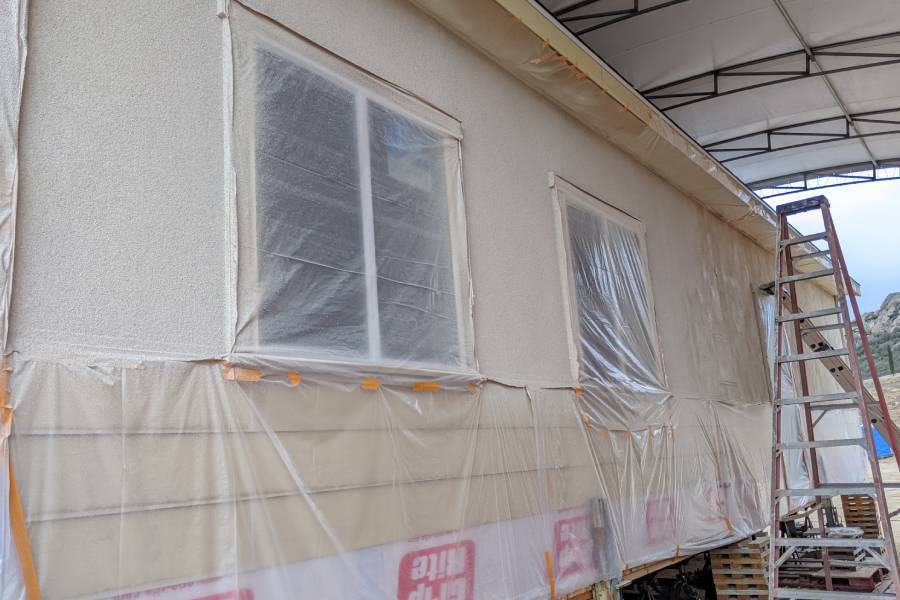Seal, Restore, and Preserve Instantly.
Industrial Cork Spray Solution
The Innovative Coating Solution for Industrial Applications

What Is Cork Spray and Why Is It Ideal for Industrial Buildings?
Cork spray is a high-performance coating made from natural cork granules, water-based resins, and emulsions such as acrylic. As a cork-based material, it provides both thermal and acoustic insulation. When applied with a spray gun, cork spray creates a breathable, waterproof, and non-toxic surface that adheres well to various building materials.
Cork insulation benefits industrial buildings due to its low thermal conductivity, fire resistance, and ability to encapsulate problematic materials like asbestos. Cork spray can be applied to fiber cement panels, metal, concrete, stucco, and wood. It is particularly effective in improving thermal insulation and reducing heat accumulation.
How Does Spray Cork Improve Energy Efficiency in Large Facilities?
Cork is an innovative solution for energy savings in industrial buildings. Its low thermal conductivity significantly reduces energy consumption for heating and cooling. By minimizing thermal bridges and improving thermal insulating properties, cork spray helps maintain a consistent interior temperature.
Applying spray cork leads to measurable energy savings, especially in extensive facilities with high utility costs. The insulating layer formed by cork spray reduces heat transfer through roofs, walls, and decks, creating a more comfortable environment and contributing to a building’s performance rating by enhancing its insulation properties.
What Are the Benefits of Spray Cork Compared to Traditional Paint or Stucco?
Cork offers a range of benefits over traditional paint or stucco. Unlike conventional coatings, cork spray is both waterproof and breathable. It resists UV rays, prevents condensation, and does not crack due to temperature fluctuations. Its emulsion blend of acrylic and water-based resins creates a flexible, durable surface that is also resistant to UV rays.
Traditional paint fades and peels over time, whereas cork paint offers superior durability and resistance to UV rays. In contrast, spray cork remains thermally efficient and adheres longer to surfaces, extending the useful life of building exteriors and interiors. It also comes in various color options and textures, similar to stucco but far more advanced in performance.
How Does Spray Cork Enhance Acoustic Insulation in Industrial Settings?
Acoustic performance matters in noisy industrial environments. Spray cork delivers effective sound absorption by dampening vibrations and blocking airborne noise. As a thermal and acoustic insulator, cork spray significantly reduces ambient noise, making workspaces more productive and less stressful.
Cork insulation benefits facilities such as manufacturing plants, warehouses, and processing centers by improving sound quality without requiring additional materials or complex installations.
Is Spray Cork Eco-Friendly and Safe to Use?
Yes. Spray cork is derived from natural cork harvested sustainably from cork oak trees, making it an environmentally friendly choice. The harvesting process does not harm the trees and supports a highly renewable resource, contributing to an environmentally friendly ecosystem. As a result, cork-based coatings like those from Kliu Cork Spray align with green building certifications.
Cork spray products are non-toxic, free from VOCs, and safe for indoor and outdoor use. They reduce exposure to synthetic chemicals commonly found in traditional coatings, providing healthier living and working conditions.
Can Spray Cork Be Applied Over Asbestos or Cement Panels?
Spray cork can encapsulate asbestos-containing materials without disturbing them, making it a safe solution for older industrial buildings. The coating seals the asbestos in place, preventing fibers from becoming airborne and providing insulation properties. This process is recognized as encapsulation and enhances both safety and compliance.
Additionally, cork spray can be applied to cement panels, fiber cement siding, and other hard surfaces. The material’s strong adhesion properties make it ideal for retrofitting older facilities with modern insulation.
What Makes Spray Cork Ideal for Roofs and Decks?
Industrial building roofing systems often face intense sun exposure, heavy rainfall, and thermal cycling. Cork spray resists UV rays and provides waterproofing, allowing the substrate to breathe. This breathable membrane prevents moisture buildup and extends the roof’s useful life.
Spray cork improves safety on decks, patios, and walkways by adding an anti-slip surface. It also reduces heat buildup on walking surfaces and protects against cracking and flaking. Cork’s durability and texture outperform standard coatings used in outdoor applications.
How Are Spray Cork Products Applied in Industrial Settings?
Applying spray cork in industrial environments requires surface preparation, a spray gun system, and trained professionals. Typically, the surface is cleaned and primed. Then, two coats of spray cork, approximately 2-3mm thick, are applied using specialized equipment.
The coating dries quickly and bonds strongly to the surface. Depending on the structure and surface you treat, spray cork can be used on interior walls, exterior surfaces, metal siding, and insulation panels. The process is suitable for both renovation and new construction.
What Are the Typical Components of Industrial-Grade Cork Spray?
Kliu Cork Spray uses a blend of natural cork granules, water-based resins, and acrylic emulsion. These elements create a high-performance coating that remains flexible, breathable, and thermal stress-resistant. Some formulations include anti-slip additives, UV stabilizers, and pigments for color customization.
Each 12 kg bucket of cork spray covers a large surface area, making it cost-effective for industrial-scale applications. Because it is made from a byproduct of the cork stopper industry, cork spray is also an example of circular economy manufacturing.
Where to Source Quality Spray Cork Products for Industrial Use?
Kliu Cork Spray manufactures and distributes cork spray for commercial and industrial use. You can purchase through their distributor network or online retailers such as BuySprayCork.com. Their products are trusted by contractors, engineers, and architects for performance-driven building upgrades, particularly in environmentally friendly projects.
Kliu spray cork is compatible with modern insulation standards and provides guidance on application, safety data, and technical specifications. Their support team assists with product selection, ensuring you get the right cork spray solution.